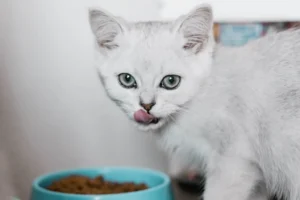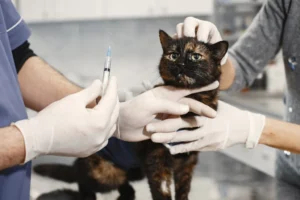Is your cat hunched over and you’re wondering why? Let’s dive into the possible reasons behind this behavior.
Your cat may be hunched over due to pain or discomfort. It could be a sign of a medical issue that needs attention.
Posture and Body Language
When your cat is hunched over, it’s crucial to pay attention to their posture and body language. Cats communicate a lot through their physical stance, so observing how they hold themselves can give you important clues about their well-being.
A cat that is hunched over may be displaying signs of discomfort or pain. They could be experiencing issues with their back, abdomen, or even internal organs. It’s important to note if your cat is also exhibiting other symptoms like lethargy, loss of appetite, or changes in behavior.
Furthermore, if your cat’s hunched-over posture is accompanied by hissing or growling, it could indicate that they are in distress or feeling defensive. In such cases, it’s best to give them space and consult with your veterinarian to rule out any underlying medical conditions.
Remember, cats are masters of hiding their pain, so being attentive to their posture and body language can help you catch potential health issues early on and provide them with the care they need.
Possible Medical Conditions
Several medical conditions could cause your cat to be hunched over. Conditions such as intestinal blockages, urinary tract infections, or arthritis could lead to posture changes in your feline friend.
If your cat is hunched over and also struggling to use the litter box or showing signs of discomfort when eliminating, it might be indicative of a urinary issue. In such cases, a visit to the vet is crucial for proper diagnosis and treatment.
Additionally, arthritis or spinal *problems can also cause cats to *hunch over due to pain and discomfort. This is especially common in older cats but can affect cats of any age.
If you notice your cat continues to hunch over or shows other concerning symptoms, do not hesitate to seek professional veterinary care. Early detection and treatment can improve your cat’s quality of life and prevent further complications.
Remember, always trust your instincts as a pet owner. If something seems off with your cat’s posture or behavior, it’s better to be safe than sorry.
Behavioral Reasons
If you notice your cat hunching over, it could be due to a variety of behavioral reasons. Cats may adopt a hunched stance when they feel anxious, threatened, or in pain. Perhaps your cat is feeling stressed by a recent change in their environment, like a new pet or a loud noise. It’s essential to observe your cat’s behavior closely to identify any triggers for their hunched posture. Try to create a calm and comfortable environment for your feline friend to help alleviate any anxiety they may be experiencing.
Seeking Professional Help
If your cat continues to hunch over or displays other concerning symptoms, it’s crucial to seek professional help from a veterinarian. Hunching over could be a sign of an underlying medical issue that requires prompt attention. Your veterinarian can conduct a thorough examination to determine the cause of your cat’s posture and recommend appropriate treatment. Early intervention can make a significant difference in your cat’s well-being, so don’t hesitate to schedule a veterinary appointment if you have any concerns about your furry companion.
Additional Unique Insight: When seeking professional help for your hunched-over cat, consider asking your vet about potential holistic treatments or alternative therapies that could complement traditional medical interventions. Some cats may benefit from acupuncture, chiropractic care, or specialized nutritional supplements as part of their treatment plan. Consulting with your veterinarian about these options could provide additional avenues for supporting your cat’s health and well-being.
Home Remedies and Care Tips
If you notice your cat hunched over, it could be a sign of pain or discomfort. First things first, gently check your cat for any visible injuries or abnormalities. If everything seems normal, try to create a comfortable and quiet space for your cat to relax. Offer them some fresh water and a cozy blanket to snuggle in. Keep an eye on their behavior and appetite, and if they continue to hunch over or show any concerning symptoms, it’s best to consult with your veterinarian.
Additionally, you can try gently massaging your cat’s back to see if it helps relieve any muscle tension. Be sure to use gentle pressure and stop if your cat shows any signs of discomfort. Providing a warm compress or heating pad (set on low heat and with a towel barrier) can also help ease any muscle stiffness or soreness.
Remember, always prioritize your cat’s comfort and well-being. If their hunching persists or worsens, seeking professional veterinary care is crucial for proper diagnosis and treatment.
Preventive Measures
To prevent your cat from hunching over in the future, it’s important to ensure they maintain a healthy weight and receive regular exercise. Obesity can put additional strain on your cat’s muscles and joints, leading to discomfort and poor posture. Provide them with a balanced diet and engaging toys to keep them active.
Regular vet check-ups are also essential in catching any potential health issues early on. Cats are masters at hiding pain, so routine exams can help detect any underlying problems before they escalate.
Creating a stress-free environment for your cat is crucial for their overall well-being. Make sure they have access to hiding spots, scratching posts, and plenty of mental stimulation. A happy and relaxed cat is less likely to develop posture problems.
Remember, proactive care and attention to your cat’s health can make a significant difference in preventing issues that may lead to hunching over.
Additional Tip:
- Encouraging proper posture and providing your cat with regular opportunities to stretch and move can help maintain their muscle strength and flexibility, reducing the likelihood of hunching over.
Interesting Facts about Cat Posture
Did you know that a cat hunching over can be a sign of fear or submission? Cats may adopt a hunched posture to make themselves appear smaller, especially when feeling threatened. This instinctual behavior helps them avoid confrontations with other animals or even with humans.
Contrary to popular belief, when a cat arches its back and hunches over, it doesn’t always mean they are in pain. It could be a display of anxiety or discomfort. Observing their overall body language and considering the context can give you clues about what they might be feeling.
Cats have a unique way of communicating through their posture. A cat that is hunched over with their tail tucked between their legs could be signaling fear or stress. On the other hand, a relaxed cat may exhibit a slight hunch when they are in a playful mood, ready to pounce on a toy.
Common Misconceptions
One common misconception about why cats hunch over is that they are always in physical pain. While pain can certainly cause a cat to hunch, it’s not the only reason. Cats may also arch their backs when they are feeling threatened, anxious, or unwell.
Another misconception is that a hunched-over posture always indicates aggression. While cats may hunch over defensively, they can also do so due to fear or discomfort. Understanding the context and observing other body language cues can help you decipher what your cat is trying to communicate.
If your cat is hunching over persistently or exhibiting other concerning symptoms like lethargy or decreased appetite, it’s essential to consult a veterinarian. They can rule out any underlying medical issues and provide appropriate treatment.
Remember, every cat is unique, and their posture can vary based on their individual personalities and preferences. By observing your cat’s body language regularly, you can better understand their needs and ensure their well-being.
Additional Insight:
Many cats may hunch over when they are marking their territory by spraying urine. This behavior is more common in unneutered male cats but can also occur in spayed and neutered felines. If your cat is hunching over and displaying this behavior, it’s essential to address the underlying cause and consider consulting a veterinarian or a behavior specialist for guidance.
Alex, a passionate animal lover, has experience in training and understanding animal behavior. As a proud pet parent to two dogs and three cats, he founded AnimalReport.net to share insights from animal experts and expand his knowledge of the animal kingdom.









